U.N. Climate Progress in Marrakech
Air Date: Week of November 18, 2016
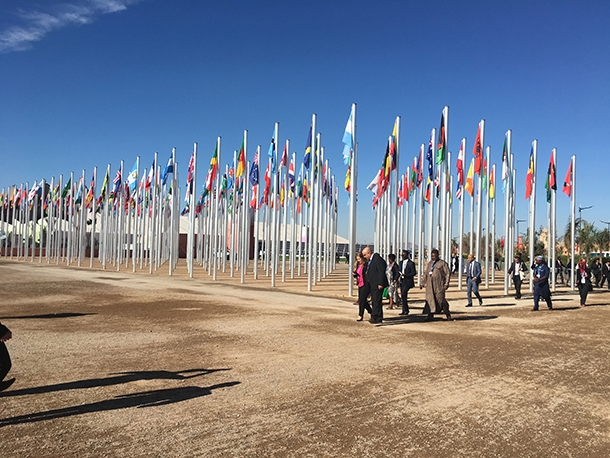
Flags from many nations greet the diverse attendees of COP 22 in Marrakech, Morocco. (Photo: Amira Kabbara)
The Paris Climate Agreement came into force just before COP22 in Marrakech, this year’s high level UN Climate talks that ended November 18th. Alden Meyer of the Union of Concerned Scientists tells host Steve Curwood member countries at the meeting in Morocco are determined to push ahead with implementing the Paris deal and work on climate protection even though the incoming US president vowed during his campaign he would ‘rip up’ the Paris accord.
Transcript
CURWOOD: From the Jennifer and Ted Stanley Studios at the University of Massachusetts Boston and PRI, this is Living on Earth. I’m Steve Curwood. The first official meeting of the Paris Climate Agreement parties wrapped up November 18 in Marrakech, Morocco. It was part of the annual UN Climate sessions, and just about all signals were go, with one major exception. That exception, of course, is the US election. President-elect Donald Trump campaigned on a promise to shred the Paris Climate deal. As the agreement is now international law, it would take four years for the US to withdraw, but according to a new report, even under President Obama, the US has already fallen behind on its commitments, along with Canada, Australia, Argentina, Saudi Arabia and Turkey. Alden Meyer of the Union of Concerned Scientists joins me from Marrakech to discuss the meeting and the impact of the US election. Alden, welcome back to Living on Earth.
MEYER: Thanks. Good to be with you again, Steve.
CURWOOD: So, tell me what was the reaction among the folks gathered there at Marrakech to Donald Trump's unexpected election as the 45th US President, specially of course, given his campaign assertion that he would cancel the Paris climate agreement.
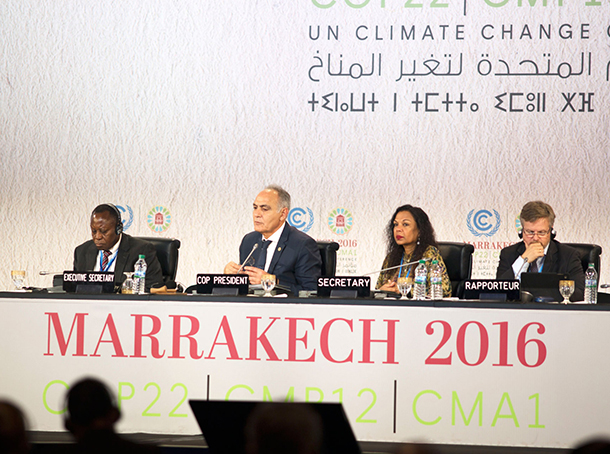
COP 22 was actually one of three climate meetings that took place simultaneously in Marrakech, Morocco from November 7th through the 18th, 2016. CMP 12 (which manages the Kyoto Protocol) and CMA 1, the first session guiding the enactment of the Paris Agreement, coincided with COP 22. (Photo: IRENA, Flickr CC BY-NC-ND 2.0)
MEYER: Well, I mean I think there was a initial shock because all the polls and the pundits back home were predicting not a comfortable Hillary Clinton win, but certainly a win in the electoral college, but of course Donald Trump does not represent all of America. There are states and cities and businesses that are going to keep moving ahead no matter what he does. We don't know whether he would fulfill what he was talking about in the campaign and pull out of the Paris agreement, so people should just hold their horses a little bit and wait and see what develops. Let Mr. Trump get his transition team place, get his key nominees in place, and then see how it plays out.
What it has done, however, over the last week is generate an unprecedented sense of solidarity among all the countries here. Country after country has said that they intend to move forward to implement and strengthen Paris. You've seen that from sub-national governments from California to Ontario to German states and others, you've seen that from cities around the world and just yesterday over 360 US companies came out and implored Mr. Trump to not pull the US out of Paris, and said that they are committed to decarbonizing their business models. So it has really united the rest of the world. There has not been one single country that has said if the US pulls out they will follow.
CURWOOD: By the way, what would Mr. Trump have to do to back out of Paris?
MEYER: Well, there's different theories here. If he wanted to pull out of the Paris Agreement, under the Paris procedures he would have to wait three years and then give one years notice, but apparently they're looking at shortcutting that with some kind of executive action to try to undo what President Obama did to join the Paris Agreement. I'm not a lawyer, and I don't know all the intricacies, but apparently they are looking at different options. They're also apparently considering the option of pulling the United States off the Rio framework treaty from 1992 where the waiting period is just one year, not four, but of course that would take the U.S. out of every aspect of the international climate regime. I call it the nuclear option.
CURWOOD: Now, Secretary of State John Kerry came to Marrakesh. What did he say and how did folks respond to him?
MEYER: Well, he was intending to come all along, even before the election results. I think he's been to something like 14 or 15 of the 22 COPS. He gave a very powerful speech yesterday detailing why it is in the world's interest to move ahead. He was talking about the impacts on the United States. He also talked about the clean energy revolution, the rapidly falling prices for efficiency and renewable energy technologies and how this can be a driver of economic prosperity for countries that move in this direction, including the United States. He talked about the large number of clean energy jobs that have already been created across the United States, and he said that he thought it would be strongly not in the United States' interest to pull out. It would hurt our standing in the world on other issues like security and trade that a Trump administration will care about, and he urged them to proceed cautiously and not act hastily.
CURWOOD: What about the role of China now, the biggest emitter?
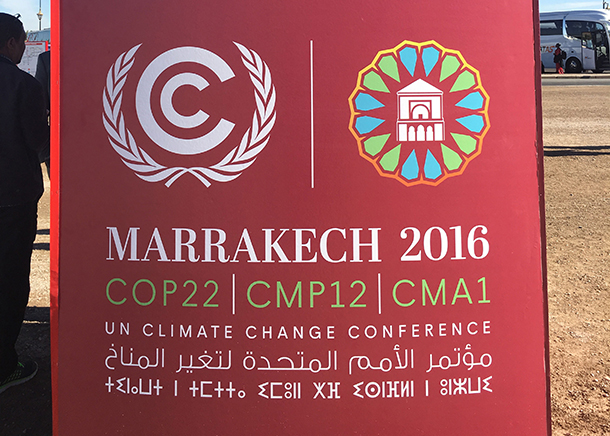
The Marrakech Climate Change Conference convened November 7th through 18th, 2016 (Photo: Amira Kabbara)
MEYER: China has made it very clear here that they intend to move forward with Paris. They see it in their own national interest to deal with air pollution, to deal with the health effects that they are seeing from their current energy system. They see also advantages to maintaining leadership in the clean energy technologies of the future, from advanced vehicles to renewable energy to battery storage. They have no intention of pulling back and I've been told actually privately by people in China that they anticipate they can overachieve the target they put forward in Paris. They have also said they would hope that the United States would stay in, they've had a very productive dialogue with the U.S. over last several years and they would welcome that to continue, but they made it very clear that if the U.S. decided to withdraw under Mr. Trump that they would continue to try to provide leadership on this issue. China has been ramping up its contributions to support vulnerable countries through so-called South-South financing of investments and clean technology and adaptation strategies, so I think from a geopolitical perspective, actually, it would create an opening for China to enhance its influence and standing of the world if the United States vacated the field.
CURWOOD: At the Marrakech session, how concerned are the less affluent countries about adaptation funding?
MEYER: Well, that's been a big focus here. They would like to see adaptation funding ramped up. Right now it represents roughly 20 percent of the total funding from developed countries, the other 80 percent being for mitigation technologies. Many of the vulnerable countries believe that ought to be more like a 50-50 ratio because as they say, it's very difficult to mobilize private finance for investments and adaptation. There's not as much opportunity to make profit in that space as there is in clean energy technology. They make it very clear that as a result of the delay in reducing emissions over the last couple decades, the adaptation financing needs have been mounting, and I think this will continue to be a major political demand of vulnerable countries in years to come.
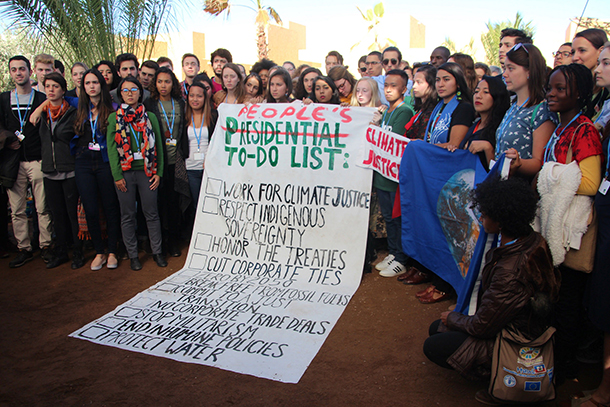
Many youth activists at the Marrakech climate talks expressed shock and dismay at the election of Donald Trump as US President on November 9, 2016. They held up a “People’s To-Do List,” edited to reflect their loss of faith in the 45th U.S. President’s ability to effect the change they seek. (Photo: Takver, Flickr CC BY-SA 2.0)
CURWOOD: At the same time, the US has released a deep decarbonization strategy to rapidly reduce US global warming emissions by the year 2050. So, Alden, what does that plan involve, and how relevant is that plan with the incoming Trump administration.
MEYER: Well, the US did release that plan yesterday, Steve. It looks out to 2050, it looks at a range of scenarios, most of them aimed at what it would take to meet the existing 80 percent reduction goal by 2050 – but one scenario also is looking at going farther. Germany also released their plan early this week looking for as much as a 95 percent reduction goal by 2050, and yesterday Canada and Mexico joined the U.S. in releasing their plans because they've been working together in a coordinated way in the North American economy. The plan is very extensive. It provides a lot of good analysis and information, not just on the energy and transportation sectors, but a pretty deep dive into land-use, forestry and agriculture and how you might ramp up the ability of the land sector to absorb carbon dioxide over the next 35 years.
It looks at the potential difficulties with carbon lock-in of infrastructure. It looks at electrification of the vehicle sector and integration with the electricity sector and issues like storage and renewables integration, so it's a very serious piece of work. It's an open question what relevance it has to the federal government over the next four years because there's no indication that Mr. Trump and his team will have any interest in building on it and looking for ways to phase out fossil fuel emissions, so it's not going to be perhaps as immediately relevant as it would have been if the election had gone the other way, but it's still a very solid piece of work and I think it's something to build on.
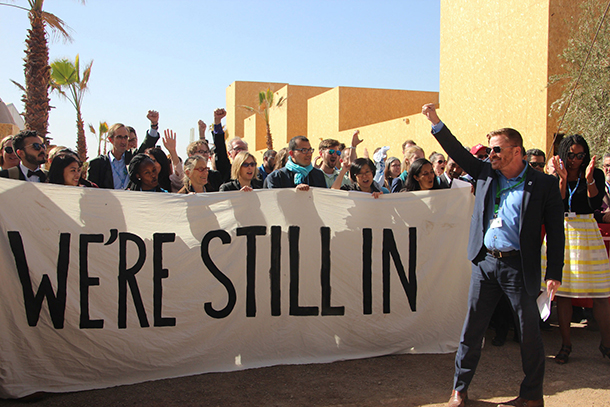
“WE’RE STILL IN,” reads a banner borne by US delegates at COP 22 in Marrakech, Morocco, in defiance of President-elect Donald Trump’s claim that he would pull the U.S. out of the Paris Agreement. (Photo: Takver, Flickr CC BY-SA 2.0)
CURWOOD: Tell me about the IPCC report, that is the Intergovernmental Panel on Climate Change – that report I believe is due in 2018. How did that shape the discussion in Marrakech?
MEYER: Well, the IPCC special report on the implications of the 1.5 degree Celsius target in the Paris Agreement is one input into what's called a facilitated dialogue that's supposed to take place at the meeting two years from now where countries are supposed to evaluate how well they are doing in meeting the emissions profile that would be needed to stay well below two degrees or come anywhere close to 1.5 degrees. And just to remind your listeners, that's important because if we don't raise the level of ambition before 2030, we're on a pathway to 2.9 to 3.4 degrees Celsius, and we're starting to foreclose the possibility of remaining below 2 or much less getting anywhere near 1.5, so that 2018 moment is not just a technical moment. It's a political moment, where countries will be challenged to sharpen their pencil and see what more they can bring to the table based on continuing reductions and efficiency in renewable technologies and changes in the economy, and it's certainly a moment that international civil society will try to make as high profile as possible.
CURWOOD: Alden, you've been going to these meetings for a long time. How well did this one go?
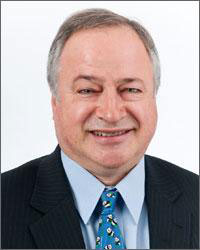
Alden Meyer is director of strategy and policy for the Union of Concerned Scientists and the director of its Washington, D.C. office. (Photo: Union of Concerned Scientists)
MEYER: I think it went well. I think in terms of the decisions and the technical work, it checked all the boxes: that they agreed within 2 years to try to complete negotiation of the detailed package implementation rules under Paris on things like accounting for land use and reporting of emissions by countries and setting up carbon markets under the Paris agreement, but this was never meant to be a great leap forward kind of COP the way that Rio, Kyoto, and Paris were, but because people were together when the results of the American election became known, I think it provided an opportunity for them to send a very strong and clear message back to Mr. Trump and his team about the solidarity of the rest of the world on this issue.
CURWOOD: Alden Meyer is Director of Strategy and Policy for the Union of Concerned Scientists. Thanks for taking the time with us today.
MEYER: Thanks, Steve. It was great to talk to you.
Links
U.S. Mid-Century Strategy for Deep Decarbonization
Analysis on how to cut US power sector emissions from Marrakesh
Financial Times: “Trump election casts shadow over COP 22 climate change talks”
Living on Earth wants to hear from you!
Living on Earth
62 Calef Highway, Suite 212
Lee, NH 03861
Telephone: 617-287-4121
E-mail: comments@loe.org
Newsletter [Click here]
Donate to Living on Earth!
Living on Earth is an independent media program and relies entirely on contributions from listeners and institutions supporting public service. Please donate now to preserve an independent environmental voice.
NewsletterLiving on Earth offers a weekly delivery of the show's rundown to your mailbox. Sign up for our newsletter today!
 Sailors For The Sea: Be the change you want to sea.
Sailors For The Sea: Be the change you want to sea.
 The Grantham Foundation for the Protection of the Environment: Committed to protecting and improving the health of the global environment.
The Grantham Foundation for the Protection of the Environment: Committed to protecting and improving the health of the global environment.
 Contribute to Living on Earth and receive, as our gift to you, an archival print of one of Mark Seth Lender's extraordinary wildlife photographs. Follow the link to see Mark's current collection of photographs.
Contribute to Living on Earth and receive, as our gift to you, an archival print of one of Mark Seth Lender's extraordinary wildlife photographs. Follow the link to see Mark's current collection of photographs.
 Buy a signed copy of Mark Seth Lender's book Smeagull the Seagull & support Living on Earth
Buy a signed copy of Mark Seth Lender's book Smeagull the Seagull & support Living on Earth

